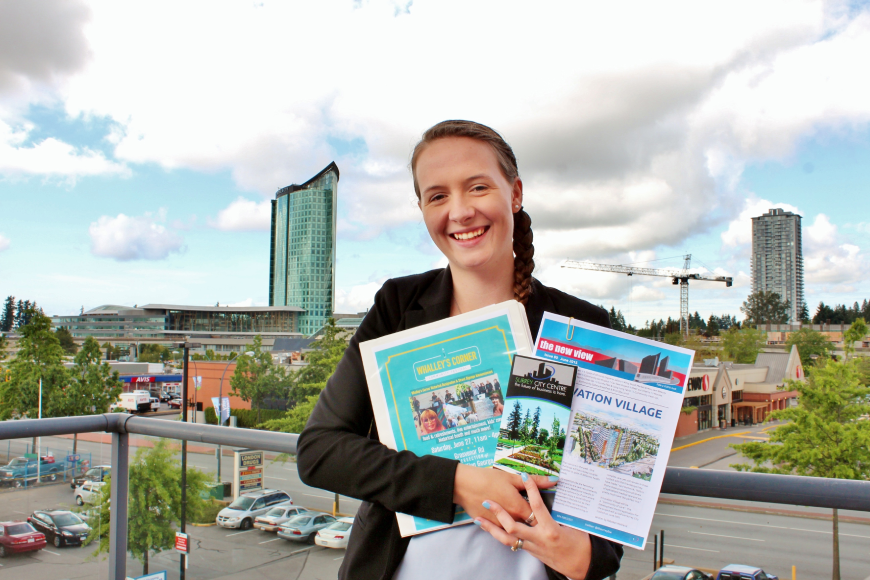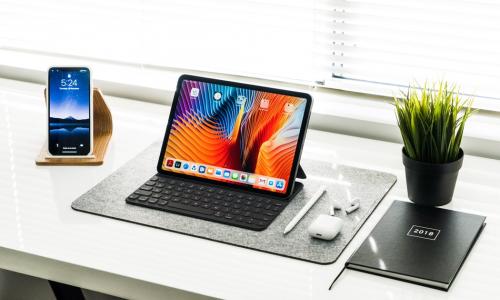
Many students’ blogs I’ve read are about what you can do to be your best for your first day, first week, or first co-op semester. Although there is no denying that the work you put into your co-op position is important, it is also valuable to consider what you can take from your co-op work term that will benefit your future career. Having completed my third co-op placement, I recommend you keep three elements in mind as you go about your work: portfolio, contacts, and resume.
Portfolios
As Communication Co-op students, our portfolios play a large role in the job application process for co-op positions and will also prove valuable once applying to jobs post-grad. The reason why portfolios are so important to the job application process is that they allow an employer to see examples of what you are capable of and what you have accomplished in your prior experiences. By having a chance to look through your top “pieces” (previous projects or designs) that you’ve placed in your portfolio, employers are able to get a better sense of whether or not you will fit well in the position they’re hiring for. It also informs them if your style of creativity will fit the type of work they want you to do.
Start gathering pieces to showcase your work during your work term. Some valuable advice I received from a colleague at my co-op placement was to print off pieces for my portfolio as I complete them. That way, at the end of the semester, I am not in a hurry running around trying to get everything together at the last minute. I encourage you to do the same as I have found it to be most helpful. Doing so ensures both that you don’t miss anything and comes in quite handy when looking back mid- or end of term to review what you have completed.
A big question I always wrestle with is which pieces to include and which pieces not to include. I don’t believe one should include everything done during a work term – that would be much too long. Instead, think of your portfolio as your highlight reel: What are your best pieces that you are most proud of? Which pieces best showcase your range of skills? Were there any projects that took extra skills to complete besides design skills? For example, I just completed a brochure where not only did I have to do the design work, but I also had to contact over 25 different architects and developers to ask for renderings and future locations of buildings. This project required networking skills, communication skills, following up, understanding the big picture and design skills. I will include that piece in my portfolio because when I show future employers, I can explain the process behind it and showcase other skills in addition to my design capabilities.
Having electronic copies of your work is also beneficial if you want to upload your portfolio onto a website or other online platform. Some of the projects you work on may be copyrighted or contain confidential information. Therefore, you should always ask your employer/supervisor first for permission to use the pieces you want to include in your portfolio. If your employer will let you, then copy your work onto your own external hard drive and take it with you.
Contacts
You will likely be introduced to a wide range of people during your placement. Keeping track of everyone can be quite difficult and even overwhelming. A strategy I used was to write down people’s names after meeting them for the first time. In addition, I would write down what facts I could remember about them: contact info, position, which company/organization they work for, their interests, and the co-workers or relations/connections they have.
Looking ahead, keeping track and remembering contacts can be extremely useful. It is in your best interest to do so not only during your placement, but also in the future when you’re looking for more co-op placements, or perhaps a job post-graduation. Being able to recall people’s names, connections, and facts about them can also be of great help when it comes to small talk at the workplace or different company/organization events. Referencing connections you make on your co-op work term will aid in expanding your social network, help to develop your workplace social skills as well as benefit you in your future post-grad employment search.
Resume
Near the end of your placement, if you can, try to sit down with your supervisor and review your time at the workplace. Ask your supervisor ahead of time if, during the discussion, you can review your resume. This gives your supervisor time to look it over and to come up with some advice and recommendations. Then, once you sit down with them, ask how they think you could improve your resume for future opportunities.
You don’t have to change your resume to fit every recommendation, but it might be insightful information to consider. At one of my co-op placements, my supervisor pointed out that I had a lot more experience and skills than my resume had indicated. Later on in the term, we sat down together and she helped explain which skills she thought I had missed – skills which, if on my resume, may increase my chances of getting more job offers or, at the very least, an interview.
So remember, put the effort in to develop your portfolio, contacts and resume, as all three of these will help you get the most out of your co-op work term and with moving forwards in your future employment pursuits.














